JARC & landrace varieties from Keramo Village in Bensa, Sidama, Ethiopia (2022)
US$0.00
Producers: Keramo community
Where: Bensa, Sidama, Ethiopia
Varieties: JARC & local landraces
Processing: Washed
Tasting notes: concord grape, darjeeling, dragon fruit
Harvest: Dec 2021- Jan 2022
Indigo fruits like concord grapes, darjeeling & delicately sweet dragon fruit describe this mashup of JARC cultivars & local landrace Setami & Mekicho well. This washed process lot is grown high in the Bombe mountains near Keramo village in Bensa, Sidama, Ethiopia with processing help from nearby Shantawene washing station.
from Catalyst Trade
“Keramo, high in the beautiful Bombe mountains in Bensa, Sidama, is so remote that the area does not have its own central washing station, so producers bring their cherries to neighbouring washing stations for processing, which results in some fun crossovers with other local districts.
Our first encounter with the unique terroir of coffees from Keramo was during the 2015-16 harvests when we purchased them as mixed lots, all sold under the name of neighbouring village Shantawene (itself an area that produces amazing coffee). We began noticing different cup dynamics from the cherries that came from different areas, and eventually began to isolate coffees by village. This led us on a journey to get even more isolation in the lots, which continues even today as this coffee processed on the same site as our Modor Shantawene using cherries brought from Keramo-area smallholder producers. It’s a fun continuation for us of a journey which allowed us to introduce Keramo coffees to the coffee-drinking world at large, and see them very successful. These coffees continue to stand out as a team favourite on the cupping table. It is dense coffee, with heavy concentrations of smaller screen sizes, which is highly unusual and reflects the higher elevations where the coffee is grown”
Producers
A gorgeous lot separation from smallholders around Keramo village in Bensa, Sidama, Ethiopia. Through the support of Catalyst Trade, cherry delivered to the washing station in neighbouring Shantawene village from the people of Keramo village are kept separate so they can be processed and exported as Keramo village coffees, allowing for the unique terroir and cup profile to be showcased.
Varieties
The smallholders from around Keramo village grow varieties that are either JARC (Jimma Agricultural Research Center) cultivars 74110 & 74158 or varieties indigenous to the area of Sidama, Setami & Mekicho, known collectively as landrace varieties.
Processing
Once the cherry is delivered by smallholders from the Keramo village, the washing station in Shantawene separates their lots and processes the coffee in a washed manner, traditional in Ethiopia the coffee is depulped and fermented underwater for anywhere from 36-72 hrs, allowing microbes to propagate dropping the ph in the tank so the sticky mucilage layer comes off during the next step, washing the coffee in channels. Finally the coffee is dried on raised beds for 7-10 days.
Water
We brew all our coffees with municipal water that flows from our taps in Metro Vancouver. This municipal source is very soft, low ppm water (less than 30 TDS)
There are many alternative water recipes out there that will produce tasty cups if your water from the tap isn’t giving you good results. A good place to start is 1/2 strength Third Wave Water of around 60-70ppm (0.16g.-0.2g./L of TWW powder).
Brewing
We make an effort to taste our coffees in a variety of ways, but mostly use cupping, V60, and Kalita 155 brews as our main ways of quality control and dialling in roast profiles. Our filter recipes can be found in our Journal here:
Espresso
We have an open-minded and flexible perspective on brewing coffee and believe that there should be numerous ways to make a tasty cup. While we are focussed on filter brewing and find it to be our personal preference, there’s no rules that limit you to exploring these as espresso too. Since they’re all roasted for filter coffee expect shots that are lighter in body and brighter in acidity than your typical espresso profile.
